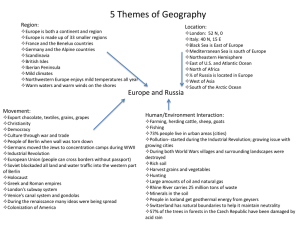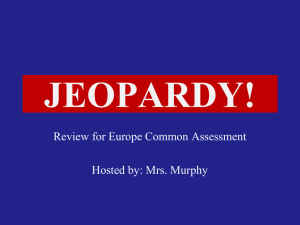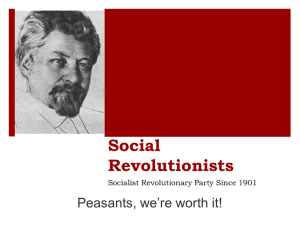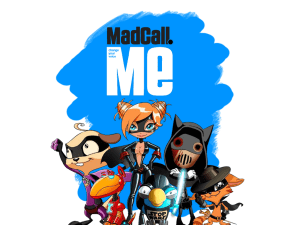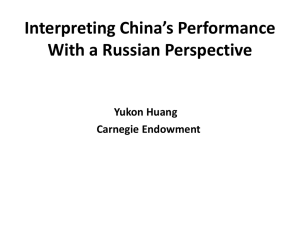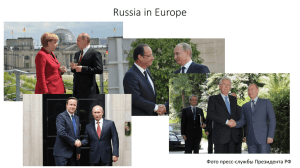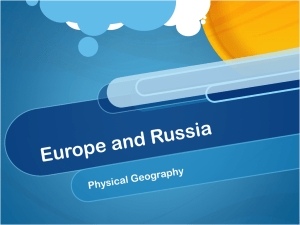The system of secondary education in Russia and in the Great Britain.
advertisement
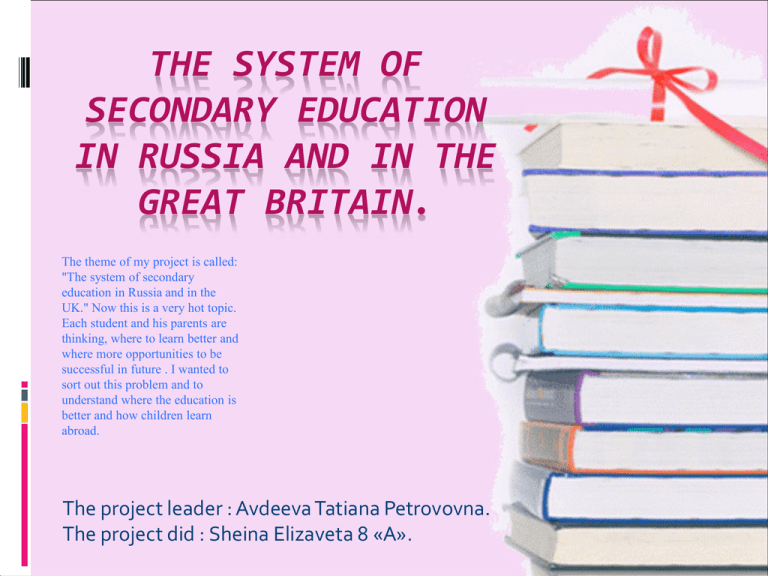
THE SYSTEM OF SECONDARY EDUCATION IN RUSSIA AND IN THE GREAT BRITAIN. The theme of my project is called: "The system of secondary education in Russia and in the UK." Now this is a very hot topic. Each student and his parents are thinking, where to learn better and where more opportunities to be successful in future . I wanted to sort out this problem and to understand where the education is better and how children learn abroad. The project leader : Avdeeva Tatiana Petrovovna. The project did : Sheina Elizaveta 8 «А». The urgency of my theme. Now this theme is very up-to-date because one day every child has to go to school to become clever and well-educated. Growing up we began thinking about our future life and what type of school would be better for us. I am fond of learning languages especially English. One day the question was set for me where to go to study: to continue my education in Russia or to go abroad in Great Britain. To decide it I need to find out and compare these two educational systems. . The purpose of the project: •Conduct a comparative analysis of the content of secondary education in Russia and in the UK. The project’s problems: •Description of the structure of secondary education in the UK. •Description of the structure of secondary education in Russia. •Identify the advantages and disadavantages of education in Russia and in the UK. •Conclusion. 27% 59% 14% What good sides of Russian education can you name? Don’t know exactly. Having passed the entrance exams well you’ve got an opportunity to have free high education. There are no good sides, I’m going to continue my education abroad. 4% 32% 64% The modern system of education in the UK. Divided into: Pre-school education.(3–5 years) Primary education.( 5-11 years) Secondary education(11-18 years) Higher education.(after 18 ) Primary education. At the age of 5 to 11 years children study at primary school. All subjects are taught by one teacher. The lesson lasts 15 to 45 minutes. What subjects do they study? 33% 15% 12% 40% Manual labor and art Physical education English Other 95% of 5-11years-old go to state-funded primary 1 0 0 schools,many of which are still run by churches. 9 0 Like secondary students 8 0 they follow a National 7 0 Curriculum with standardised tests at key6 0 stages every 2 years. 5 0 5% go to independent 4 0 free-paying school. Here 30 pupils may take the 20 Common Entrance Examination set by the 1 0 independent secondary 0 schools. Prim ary schools. 95% Independent freepaying school. 5% Secondary education. Grammar School. Combined School. They are most widespread In these schools children schools. 90% of the students receive general upper study there. Combined schools secondary education. The basis of academic work on the were established with the aim of creating equal opportunities for principle of differentiated education. curriculum. 85% of 11-16 year –olds go to Comprehensive schools, which do not select pupils by ability. 8% go to independent fee-paying schools which are also known as public schools. 5% who pass go to grammar schools. 2% who fail go to secondary modern schools and the rest to comprehensive schools. 90 80 70 60 50 Table 40 30 20 10 0 8% 85% 2% 5% Public schools. Public schools - secondary educational institutions that accept children aged 8 to 18. Education is free. Private schools. Private schools - well-equipped school, owning several hundred acres of land in the territory of which the academic buildings are located. Training is paid. Secondary education in the UK. The UK education system in accordance with the administrative division and traditions is divided into three subsystems: • England and Wales, • Northern Ireland • Scotland. Legislatively compulsory free education was introduced for pupils to 16 years. A system of compulsory education covers children and adolescents from 5 to 16 years. The school year - 38 week. The year is divided into trimesters, which are separated by vacation: • Summer (6 weeks) • Christmas and Easter (2-3 weeks). In the mid-trimester week break is provided. School week usually lasts 5 days. The school day from 9:00 to 15:30 with lunch break and morning prayers. There is a minimum number of hours per week. School has the discretion to increase the training load week. Education in Russia. Pre-school Primary education. Incomplete education. Begins with the age secondary Gives children the basic knowledge. Children attend a garden with 2 years and 6 years. of 6 and lasts for 4 years. In secondary schools, high schools, secondary schools within 5 years. Complete secondary education. On completion of training in 10-11 grade, students receive a Certificate of Secondary Education and have the right to enter a university. education. Higher Education. Training in Russian schools in light of the new reform begins at 6 years and up to grade 11. Primary education. Primary education - the first stage of general education. In Russia, primary education is compulsory and available to everyone. The priority of primary education is the formation of skills, level of development which largely involves the success of all subsequent learning. The main objectives of primary education: •The development of the students, their creative abilities. • Educating moral and esthetic senses. • Development of systems of knowledge and skills. • Protection and promotion of physical and psychological health. Secondary education. At the age of 10, children go to secondary school, in which training lasts 5 years. At 15 years they finish this level and receive a certificate of general secondary education. Lyceum education. Lyceum - the type of secondary or higher education institution. The name "Lyceum" take some high schools with in-depth study of the subject of a specific profile. Today lyceum education develops first of all at schools with the physical and mathematical bias which activity is initiated by universities and technical high schools. Gymnasium. Gymnasiums in Russia are mainly state schools for children of 6 till 18 who have a grate motivation for getting knowledge, as well as other types of schools represent an opportunity to continue education at universities. The system of secondary education in Russia. Today's education system in Russia – federal, centralized. The school education maintenance in Russia is a basis of educational system, and it is the basic object of reforms and updating. A system of compulsory education covers children and adolescents from 7 to 18 years. The school year - 34 weeks. The year is divided into trimesters and quarters, which are separated by vacation: • Summer ( 3 month) • Christmas and Easter (2 weeks) • Spring (1 week ) • Autumn (1 week) School week usually lasts 5 - 6 days. The school day from 9:00 to 14:50 or from 8:30 to 14:30 with lunch break. Differences of education in Russia and in the UK. Russia Modern system of •Pre-school education. education include: •Primary education. •Incomplete secondary education. •Complete secondary education Year divided into: •Higher education. Great Britain •Pre - school education •Primary education. •Secondary education. •Higher education. Trimesters and quarters, which are Trimesters, which are separated by separated by vacation: vacation: Summer ( 3 month) Summer (6 weeks) Christmas and Easter (2 weeks) Christmas and Easter (2-3 weeks). Spring (1 week ) Autumn (1 week) Compulsory education starts: 7 years old. 5 years old. School year: 38 weeks. 34 weeks School week lasts: 5 days. 5-6 days. School days lasts: From 9:00 to 14:50 or from 8:30 to 14:30 with lunch break. Primary education. From 9:00 to 15:30 with lunch break and morning prayers. The lesson lasts: 40-45 minutes 15-45 minutes Type of schools: Grammatical Combined - After graduation primary schools children: Pass exams . Don't pass exams. Similarities of education in Russia and in the UK . Russia. Great Britain The system of free secondary education for all children, regarding to social status, national origin, operates throughout the country. Schools: Municipal and private. Primary education. All subjects are taught by one teacher. Secondary schools. Public schools and Private schools After graduation students pass exams GCSE RSE Conclusion. Comparing these two very different structures of education, I realized that education in the UK it is better only because after 9 of his class in British schools introduced the division into specialized education. But at the present time in Russia, some schools introduce specialized education after high school. That's why I think it's better to learn where you want and like, because everything in our hands.



